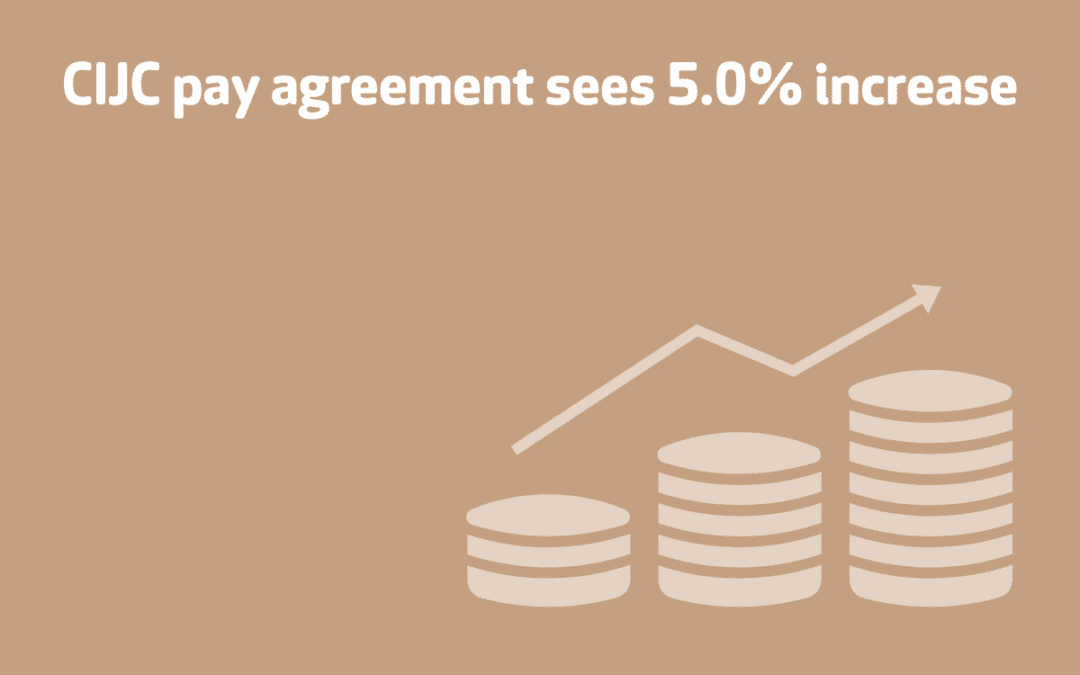
by Clair Mooney | Jul 5, 2022 | Main News Feed
The Construction Industry Joint Council (CIJC) has completed negotiations with trade unions GMB and Unite the Union and reached agreement on a 5.0% increase in all pay rates, which will take effect from Monday 25 July 2022. Non‐taxable elements of pay, such as travel and subsistence allowances, will also increase,
The Construction Industry Joint Council (CIJC) Working Rule Agreement – sometimes referred to as ‘The Pink Book’ – is an agreement between employers and Trade Unions setting out terms and conditions, including national pay rates, that are applied in principle by ‘adherent bodies’ and others across the industry. The aim of CIJC is to help avoid industrial disputes, and simplify the process of negotiating terms between employers and workers. In addition to standard rates of pay, not taxable expenses such as travel and accommodation costs, are incorporated into the agreement.
FIS is represented and the Board were consulted and fed vies in via our membership of Build UK. Other organisations involved in the negotiations include Civil Engineering Contractors Association (CECA), Home Builders Federation (HBF), National Access & Scaffolding Confederation (NASC), National Federation of Builders (NFB), National Federation of Roofing Contractors (NFRC), Painting & Decorating Association (PDA), Scottish Building Federation (SBF) and Trades Unions Unite the Union and GMB.

by Clair Mooney | Jun 29, 2022 | Main News Feed
FIS is supporting this year’s Inspiring Change Conference and Awards Ceremony, which is taking place on Wednesday 6 July in London. If you haven’t yet booked your place, this is your last chance. You can register here
The Inspiring Change Conference 2022 is part of the FIR in Construction Programme, sponsored by CITB. It is your opportunity to hear inspirational speakers from diverse backgrounds, including politicians, industry stakeholders, and representatives from other sectors, who have promoted culture change within their organisations to create more inclusive workplaces and communities.
Hear from those who attended our last event
On the day you will:
- Hear about good practice from within the construction industry and beyond
- Learn how to attract and retain a more diverse workforce
- Develop your knowledge and understanding of how an inclusive culture is good for business and can positively influence organisational change
- Be inspired to work together to create a more diverse and inclusive industry
- Network with over 300 like-minded professionals from a range of organisations within the sector
The conference will incorporate the Inspiring Change Awards which highlight and reward organisations within the construction and infrastructure sector that have created more inclusive cultures in their workplaces, education, and the community.
The conference will be followed by Drinks Reception until 6pm.
Who should attend:
Those who can influence culture change within their organisation – Directors and Senior managers such as Chief Executives, leaders in Business Improvement and Business Development, Supply Chain and Procurement, HR and EDI Managers, Community Engagement, FIR Ambassadors and advocate on equality and inclusion.

by Clair Mooney | Jun 23, 2022 | Main News Feed
One of UK construction’s most recognised executives has been chosen to succeed Andy Mitchell as the new Co-Chair of the Construction Leadership Council.
Following an open recruitment process, an independent panel comprising industry, members of the CLC’s Senior Advisors Group and Government officials, recommended Mark Reynolds (Mace Group Chairman and CEO) to lead the CLC in partnership with Lee Rowley MP (BEIS Minister for Industry). The panel also recommended Richard Robinson (CEO, Atkins UK and Europe) for the newly created Deputy Co-Chair role.
Mr Reynolds has played a key leadership role in the CLC in recent years, including jointly chairing its People & Skills work stream; and co-ordinating its response to the Covid pandemic. As a member of CLC’s Steering Co-Ordination Group, he shaped the CLC’s 2022 Strategy with its focus on Construct Zero, Building Safety, meeting the skills challenge, and implementing the Construction Playbook. He also chairs the Government’s Construction Skills Delivery Group.
Mr Reynolds will be building on the four CLC priorities as he officially takes on the role today – 23 June 2022
Mr Reynolds commented:
“I am delighted to take on this exciting co-chair role following the great work by Andy over the last four years. During that time, I have seen first-hand how the CLC can make a real difference for companies across the whole of the industry”.
“We have faced – and continue to face – challenges that no one organisation can tackle on its own, such as the cost of inflation and impact of rising energy prices; global supply chain pressures and ensuring our collective progression to Net Zero. I am also very pleased to be working with Richard Robinson, CEO for Atkins UK and Europe, on this agenda; who will strengthen our collective leadership and capacity in his role as Deputy Co-Chair.”
“The CLC, working in partnership with Government, provides crucial leadership to the sector. We do this most effectively where we speak to, and for, all parts of industry. Whilst I will continue the CLC’s focus on its four priorities, I would like to engage and listen to the wider industry over the summer to ensure we continue to deliver on the issues that matter most to us as a sector. I want to take this opportunity to encourage organisations across construction to get involved with the CLC’s work.”
Commenting on the appointment, Construction Minister Lee Rowley MP said:
“It’s a pleasure to welcome Mark as the new chair of the CLC. He’s been a key part of the Council in recent years, helping coordinate the industry’s Covid response, as well as supporting job creation in his role with the Construction Skills Delivery Group.
Mark will play a vital role in the months and years ahead as we work to decarbonise the industry through Construct Zero, support it through the Building Safety Act’s introduction, and deliver the first sector-wide skills plan for construction.
I would also like to pay tribute to Andy Mitchell for his outstanding leadership to date, which puts the CLC in a strong position to keep delivering for the sector.”
Outgoing chair Andy Mitchell said:
“The CLC is in a great position to lead industry transformation, working together to overcome any issues that may affect companies nationwide. I am delighted that Mark will be driving forward the Council’s agenda, and look forward to seeing the outputs of its work in the future”.

by Clair Mooney | Jun 23, 2022 | Main News Feed, Transformation
The Construction Innovation Hub is celebrating the completion of the Value Toolkit, following a successful development programme with over 200 industry partners. The announcements include the launch of a new BSI flex standard to underpin value-based decisions making in the sector.
Bringing together those who have contributed to its journey, including government, clients and industry partners, the Hub is now sharing the transition phase to adoption.
The Value Toolkit is a pioneering suite of tools that will be used by industry to embed value-based decision making in the built environment sector. It is a government funded industry-led initiative – with roots in the Construction Leadership Council’s Procuring for Value report and set to deliver on the ambitions of the Construction Playbook and the IPA’s Transforming Infrastructure Performance Roadmap.
The Toolkit has been developed to reframe the definition of value, and how it can be evaluated and measured, capturing wider, whole-life considerations around net-zero, user experience, productivity and social impact.
Working with partners and collaborating has been critical to the success and there are few corners of the sector that the Value Toolkit has not touched – from local authorities to central government departments, consultancies, contractors and specialist SMEs. The ambition is now for widespread adoption, driven by government and underpinned by industry.
Keith Waller, Programme Director at the Construction Innovation Hub, said:
This is a landmark moment for the Hub and our industry partners, and a gamechanger for construction and the built environment.
Decision making in construction has been historically driven by how much something cost, or how long it took to build. The Toolkit delivers a laser-like focus on project outcomes that delivers value beyond the bottom line, and positively affect communities and those who live in them for decades to come. It will ensure a more collaborative relationship between clients and suppliers throughout the whole life of a project”.
Construction Minister Lee Rowley MP said:
It’s good to see this new initiative come to fruition after a successful pilot. The Toolkit reflects the Government’s desire to ensure we embrace a construction procurement process that has clean, green innovation at its heart.
It complements our commitment to boost the productivity of this vital industry as part of our plans to grow the economy and create good quality jobs. I look forward to continuing to work with the Construction Leadership Council to realise this ambition.”
Rory Kennedy, Value Toolkit Strategy Board Chair and Director of Capital, Department for Education said:
This is a proud day for the many individuals, businesses and organisations who have worked tirelessly through huge collaborative effort to develop, evolve and shape the Value Toolkit.
The Value Toolkit is a powerful initiative that enables value-based decision-making – that best reflect the full range of commonly desired benefits, including better social, environmental and economic outcomes. Government, clients, and the industry all agree that a different approach to value is needed. An approach that reflects a shared ambition for a built environment that delivers more – one that provides a springboard for economic growth, enhances communities, and sustains the environment. The Value Toolkit is this new approach.
I look forward to seeing the Value Toolkit go from strength to strength as Government and industry drive wider adoption”.
Andy Mitchell, Co-Chair of the Construction Leadership Council (CLC) commented:
For far too long now we have talked cost with little or no reference to value; we have talked outputs not outcomes. The Value Toolkit seeks to see an end to this by providing a comprehensive suite of tools that will help clients and suppliers alike develop a real understanding of what is actually important as we specify, design and deliver infrastructure for people and society.
I would like to thank everyone involved in getting us to this point, and encourage everyone else to understand, use and help develop this Toolkit going forward”
More information about the Value Toolkit and how to get involved is available here.

by Clair Mooney | Jun 23, 2022 | Main News Feed, Market data, Material Shortages
With the industry facing inflationary pressures not seen in the UK for 40 years, cost escalation is a key issue for members across the supply chain. Last week, the Bank of England raised interest rates for the fourth time this year to 1.25% and reported that “construction output growth weakened modestly as rising materials costs and labour shortages caused projects to be delayed or cancelled”.
Against this backdrop, companies need to find ways to manage the risk of cost inflation during a project and Build UK has worked with Wedlake Bell LLP to publish guidance, which is available to FIS members. Managing Price Inflation includes practical advice on fluctuations clauses, negotiating new and existing contracts to take inflation into account, and how to mitigate its impact on projects. As with COVID‐19, all parties are advised to collaborate in finding solutions, as more time spent planning ahead and thinking strategically about procurement is likely to be the first step towards successful cost management.
For further information on prices and inflation and work FIS is doing to support members in this area, click here.

by Clair Mooney | Jun 16, 2022 | Main News Feed
In line with plans to ensure all new HGVs are zero emission by 2040 at the latest, the Government has published a call for evidence on a potential limited range of exemptions for vehicles weighing 26 tonnes or under. The deadline for submitting views on the proposals is Friday 22 July.






